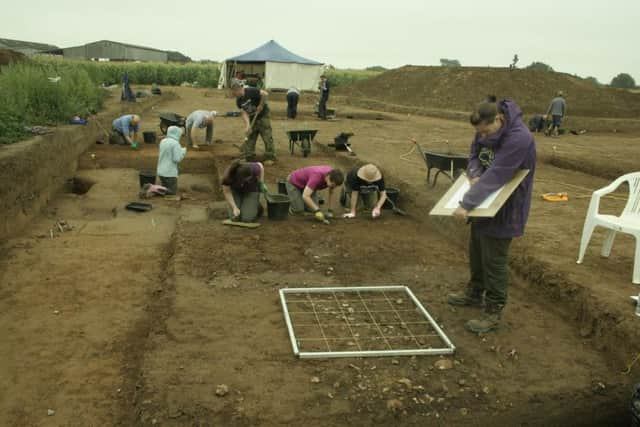Chance to be a part of history at summer archeological digs
This article contains affiliate links. We may earn a small commission on items purchased through this article, but that does not affect our editorial judgement.


The Plumpton Roman Villa site was first discovered in 1973 when a rectangular pattern of flint and chalk was noticed in one of the Agricultural College fields.
Surface artefact collection and geophysics showed it to be the site of a small 4th century Roman villa. Further geophysics in 2014 revealed the chalk and flint walls of a ‘winged corridor’ villa, prior to an area being excavated revealing the wall foundations of several rooms.
Advertisement
Hide AdAdvertisement
Hide AdDuring late June and July 2015, excavations were undertaken at the site of the Romano-British villa. It was thus possible to fully expose the centre and the eastern end of the winged building.
The Sussex Archaeological Society is again offering its popular and comprehensive five-day Excavation Training Courses starting each Monday between June 18 and July 30. It will also run a range of Excavation Techniques for Beginners ‘taster’ days. Other one-day courses cover more specialist topics.
Volunteer opportunities at Plumpton are available from £5 a day with a maximum charge of £50 for the season.
Send an email to [email protected] or visit www.sussexarchaeology.org for more information.
Advertisement
Hide AdAdvertisement
Hide AdThe Bridge Farm Settlement was discovered in 2011. The Roman settlement at Bridge Farm shows activity from the late 1st to the late 4th centuries, spanning the Roman occupation period and pre and post-dating the nearby villa and bathhouse at Barcombe. The site is in a pivotal location at the junction of three main Roman roads and the River Ouse and stretches over several hectares, with the early open settlement enclosed temporarily by a double defensive ditch in the late 2nd century. Unlike Plumpton Villa, most of the structures on this site were made of timber and during the 2014 excavations, the team discovered the remains of a rectangular building of 13 large postholes containing waterlogged timbers from nearly 2,000 years in the past - a significantly rare find.
The 2016 excavation will target the defensive ditches under the direction of Rob Wallace and David Millum of the Culver Archaeological Project. CAP has always actively encouraged the local community, students and volunteers to participate in their annual summer excavation, which this year will run seven days a week from June 27 to August 21.
The project is funded by a charge to volunteers (£25 for seven days, £40 for 14 days or £60 for eight weeks), plus any much-welcomed donations.
Visit www.culverproject.co.uk or email [email protected] for more.
Advertisement
Hide AdAdvertisement
Hide AdBridge Farm excavations will be open for public visits as part of the CBA Festival of Archaeology. Visit www.archaeologyfestival.org.uk.
Don’t miss out on all the latest breaking news where you live.
Here are four ways you can be sure you’ll be amongst the first to know what’s going on.
1) Make our website your homepage at www.sussexexpress.co.uk/
Advertisement
Hide AdAdvertisement
Hide Ad2) Like our Facebook page at www.facebook.com/pages/Sussex-Express/
3) Follow us on Twitter @sussex_express
4) Register with us by clicking on ‘sign in’ (top right corner). You can then receive our daily newsletter AND add your point of view to stories that you read here.
And do share with your family and friends - so they don’t miss out!
The Sussex Express - always the first with your local news.
Be part of it.